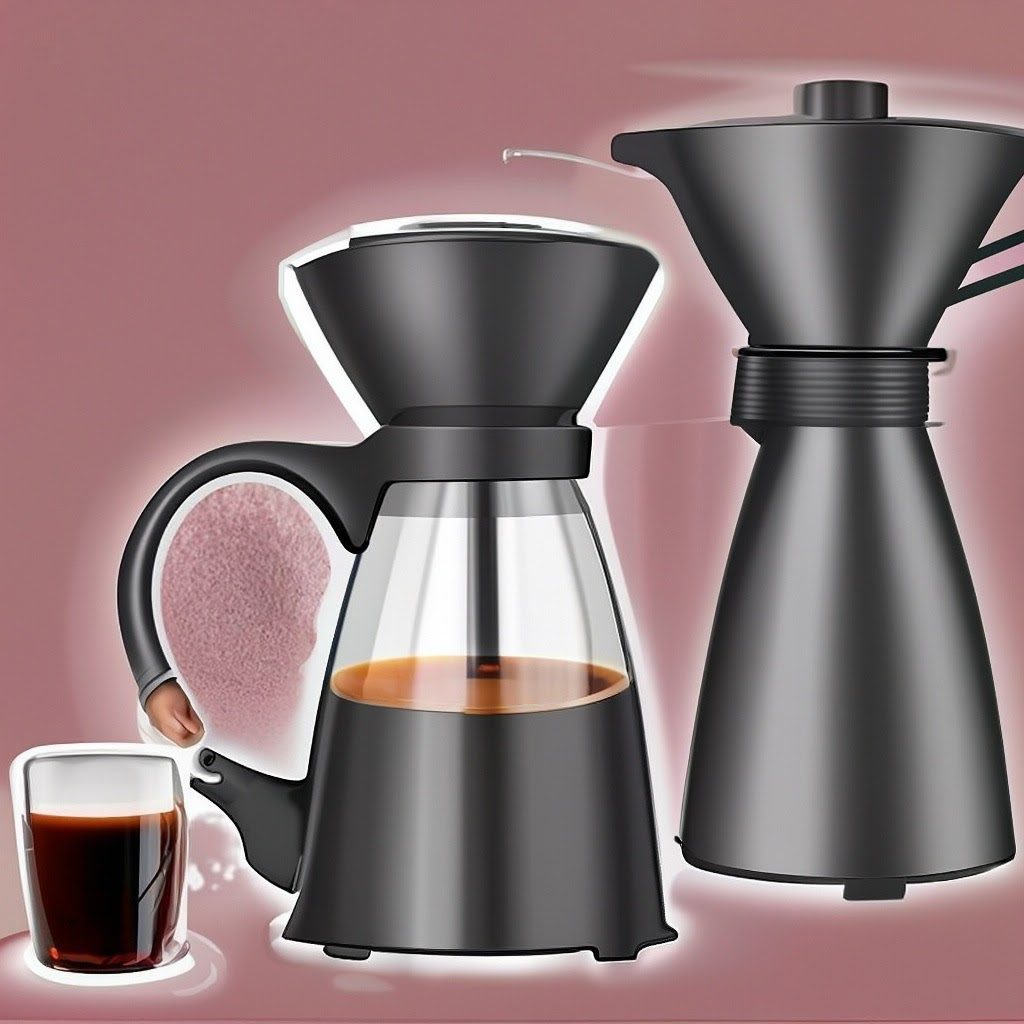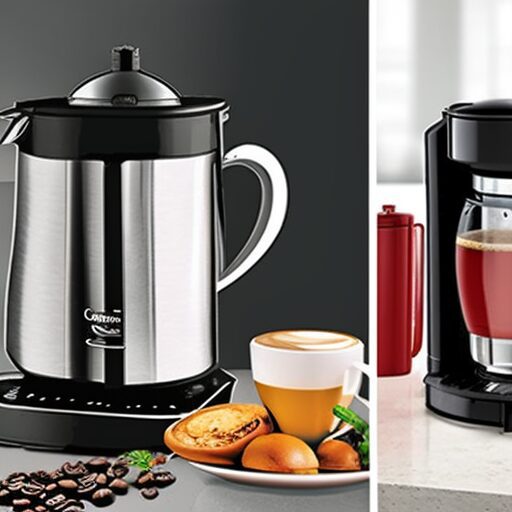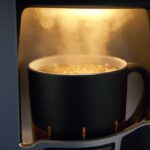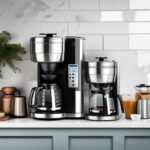
It’s no secret that coffee has become a daily ritual for many people around the world. But have you ever stopped to wonder if your beloved coffee maker is as safe as you think?
In this article, we will explore the important question of whether or not, Are Coffee Makers BPA-free. With concerns about the potential health risks associated with BPA, it’s essential to understand the facts and make informed decisions about the products we use every day.
So, let’s dive in and uncover the truth about whether Are Coffee Makers BPA free?
Potential Health Concerns with BPA
What is BPA?
Bisphenol A, commonly known as BPA, is an industrial chemical used in the production of certain types of plastics and resins. It has been widely used in many consumer products, including food and beverage containers, water bottles, and even coffee makers.
BPA is known to leach into food and beverages, especially when exposed to heat or acidic conditions. Concerns have been raised about the potential health risks associated with BPA exposure.
What Pan Is Best For Grilling?
Health risks associated with BPA exposure
Research suggests that BPA may have adverse effects on human health. Studies have shown that BPA can mimic the hormone estrogen, disrupting the endocrine system and potentially leading to various health problems.
Some health risks associated with BPA exposure include reproductive disorders, developmental problems in children, increased risk of certain cancers, and cardiovascular diseases.
While the exact impact of BPA on human health is still being studied, it is important to be aware of potential risks and take necessary precautions.
Understanding BPA-Free


What does BPA-Free mean?
When a product is labeled as “BPA-Free,” it means that it does not contain Bisphenol A or any other harmful chemicals associated with BPA. BPA-Free products are often marketed as a safer alternative, especially for items that come into direct contact with food and beverages, such as coffee makers. By choosing BPA-Free products, you can reduce your exposure to potentially harmful chemicals.
Regulations and certifications for BPA-Free products
Various organizations, such as the U.S. Food and Drug Administration (FDA) and the European Food Safety Authority (EFSA), have set regulations and guidelines for the use of BPA in consumer products.
Additionally, some independent certification programs, like the NSF International certification, ensure that products comply with specific BPA-Free standards.
These regulations and certifications help consumers make informed choices and have confidence in the safety of BPA-Free products.
Types of Coffee Makers
Traditional Drip Coffee Makers
Traditional drip coffee makers are a popular choice for many coffee lovers. They work by pouring hot water over coffee grounds placed in a filter, allowing the brewed coffee to drip into a carafe or pot underneath. Drip coffee makers come in various sizes and designs, offering convenience and flexibility in brewing larger quantities of coffee at once.
Single Serve Coffee Makers
Single-serve coffee makers have gained popularity in recent years due to their convenience and efficiency. These machines use pre-packaged coffee pods or capsules to produce a single cup of coffee.
Single-serve coffee makers are perfect for individuals with busy lifestyles or those who prefer a wide variety of coffee flavors without the need to brew an entire pot.
Espresso Machines
Espresso machines are a favorite among espresso enthusiasts and those who enjoy specialty coffee beverages. These machines use pressure to force hot water through finely-ground coffee, resulting in a concentrated shot of espresso.
Espresso machines come in various types, including manual, semi-automatic, and fully automatic, allowing users to control every aspect of the espresso-making process.
Materials Used in Coffee Makers
Common materials in coffee makers
Coffee makers are typically made from a combination of materials, each with its benefits and drawbacks. Some common materials used in coffee makers include plastic, glass, stainless steel, and ceramic.
Plastic is lightweight and affordable but can potentially leach harmful chemicals like BPA. Glass offers a clean and inert surface but may be more fragile.
Stainless steel is durable and easy to clean, but it may retain heat differently. Ceramic provides excellent heat retention and is aesthetically appealing but can be delicate.
Benefits and drawbacks of each material
Plastic coffee makers are often lightweight and more affordable than other options. However, there is a concern about the potential leaching of BPA and other harmful substances from plastic into the brewed coffee.
Glass coffee makers, on the other hand, offer a non-reactive and visually pleasing brewing surface. However, they can be more fragile and require careful handling. Stainless steel coffee makers are durable, easy to clean, and can retain heat well.
However, they may have a different heat distribution compared to other materials. Ceramic coffee makers are known for their excellent heat retention and aesthetic appeal, but they can be prone to breakage if not handled with care.
BPA in Coffee Makers
Historical use of BPA in coffee makers
In the past, BPA was commonly used in the production of coffee makers, especially in the plastic components. This was primarily due to the durability and heat-resistance properties of BPA-containing plastics.
However, as concerns about the potential health risks of BPA exposure grew, manufacturers started to develop BPA-Free alternatives to ensure the safety of coffee makers.
Risks associated with BPA in coffee makers
Using coffee makers that contain BPA may lead to the leaching of this chemical into your brewed coffee. The heat and acidity of the brewing process can increase the chances of BPA being released from the plastic components and contaminating your beverage.
Prolonged exposure to BPA has been linked to various health risks, including reproductive disorders, developmental problems, and an increased risk of certain cancers. Therefore, choosing BPA-Free coffee makers is crucial to minimize potential health concerns.
Leading BPA-Free Coffee Maker Brands
Brand 1
Brand 1 is renowned for its commitment to producing BPA-Free coffee makers. They prioritize the use of safe and high-quality materials free from harmful chemicals. Their coffee makers are known for their durability, performance, and ease of use.
With a wide range of options and innovative features, Brand 1 has become a popular choice for coffee lovers seeking BPA-free alternatives.
Brand 2
Brand 2 is another well-established brand that offers a variety of BPA-free coffee makers. Known for their sleek designs and advanced brewing technologies, their coffee makers deliver exceptional flavor and convenience.
They prioritize consumer safety and ensure that their products meet the highest standards of quality and BPA-Free certifications.
Brand 3
Brand 3 has made a name for itself as a leader in the production of BPA-Free coffee makers. Their products are known for their durability, reliability, and eco-friendly features.
Brand 3 is committed to reducing environmental impact while providing coffee enthusiasts with safe and enjoyable brewing experiences. With a range of stylish and functional options, Brand 3 offers something for every coffee lover.
How to Determine if a Coffee Maker is BPA-Free?
Checking product labels and descriptions
When shopping for a coffee maker, carefully read the product labels and descriptions. Look for explicit statements indicating that the coffee maker is BPA-free.
Manufacturers often highlight this feature to assure consumers of the safety and quality of their products.
Pay attention to any BPA-Free certifications or compliance with safety regulations mentioned by the manufacturer.
Contacting the manufacturer
If the coffee maker’s packaging or online information does not clearly state whether it is BPA-Free, consider reaching out to the manufacturer directly.
Manufacturers should be able to provide information on the materials used in their coffee makers and whether they contain BPA or any other harmful chemicals.
By contacting the manufacturer, you can make an informed decision and choose a coffee maker that aligns with your health and safety preferences.
Alternatives to BPA
New materials and technologies
With the increasing awareness of the potential health risks of BPA, many manufacturers have started incorporating alternative materials in their coffee makers. These materials are often BPA-Free and offer similar properties in terms of durability and heat resistance.
Some alternatives to BPA in coffee makers include Tritan, stainless steel, borosilicate glass, and ceramic. These materials provide safe and reliable alternatives while maintaining the functionality and brewing performance desired by coffee enthusiasts.
What Size Grill Do I Need For A Family Of 4?
Other concerns to consider with alternative materials
While BPA-Free alternatives offer a safer option, it is important to consider other factors as well. For example, some alternative materials may be more expensive or require specific care and maintenance.
Additionally, the manufacturing process and disposal of these materials may have environmental implications. It is crucial to weigh these factors against the potential health risks associated with BPA and make an informed decision based on your personal preferences and values.
Benefits of BPA-Free Coffee Makers
Reduced health risks
One of the primary benefits of choosing a BPA-Free coffee maker is the reduced risk of exposure to harmful chemicals.
By opting for BPA-free alternatives, you can enjoy your favorite coffee without worrying about potential health concerns associated with BPA. These coffee makers provide peace of mind, allowing you to focus on the enjoyment of your daily cup of coffee.
Environmentally friendly
Many BPA-Free coffee makers are designed with sustainable and eco-friendly features in mind. Some manufacturers prioritize using recyclable materials or reducing their carbon footprint during the manufacturing process.
By choosing an environmentally friendly BPA-Free coffee maker, you can make a positive impact on the planet and contribute to a more sustainable future.
Is It Worth Buying A Griddle Pan?
Conclusion
Importance of choosing a BPA-Free coffee maker
When it comes to your health and well-being, it is crucial to make informed choices, even when it comes to something as simple as your coffee maker. The potential health risks associated with BPA exposure should not be taken lightly, and choosing a BPA-free coffee maker can greatly minimize those risks.
By selecting a coffee maker that is free from harmful chemicals like BPA, you can prioritize your safety and enjoy your coffee with peace of mind.
Final considerations
While the availability of BPA-Free coffee makers has increased, it is still essential to do your research and carefully consider your options. Pay attention to product labels, and certifications, and contact manufacturers if necessary to ensure that the coffee maker you choose is indeed BPA-Free.
Additionally, consider other factors such as material choices, alternative technologies, and environmental impact when making your decision. By investing in a BPA-Free coffee maker, you can safeguard your health, enjoy your coffee, and contribute to a safer and more sustainable future.
Top 8 Best-Rated Automatic Food Vacuum Sealer Machines For Kitchen







